This article is more than 5 years old.
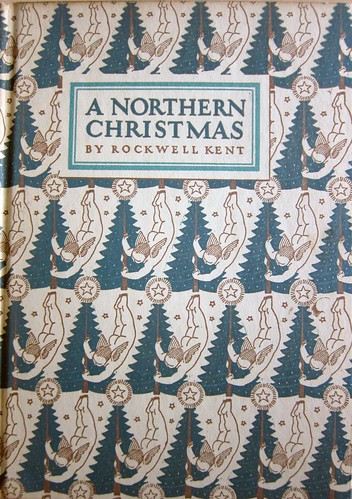
American artist Rockwell Kent spent Christmas 1918 in a small cabin on an island off the south coast of Alaska. More than twenty years later he recalled the experience in words and woodcut illustrations in a holiday gift book titled A Northern Christmas.
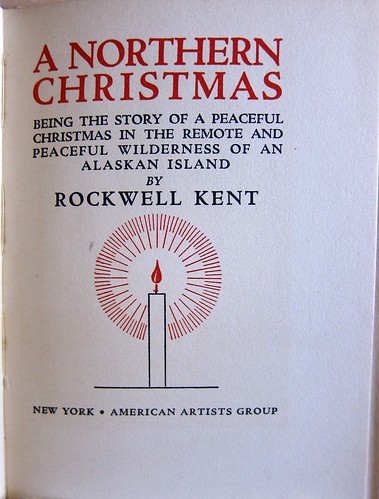
The small book was published by the American Artists Group, an organization founded in 1935 for the purpose of providing art for the masses and, in the process, creating a market for artists to earn a living during the difficult years of the Depression. Many prominent artists were members, including Edward Hopper, John Sloan, Thomas Hart Benton, Yasuo Kuniyoshi, Max Weber, and Eugene Speicher. The American Artists Group published small monographs and offered unsigned engravings, lithographs, and woodcut prints for sale at very affordable prices. But the group was perhaps best known for its yearly offerings of Christmas cards designed by its artists. In 1941 they also began a series of small holiday gift books, of which A Northern Christmas was the first.
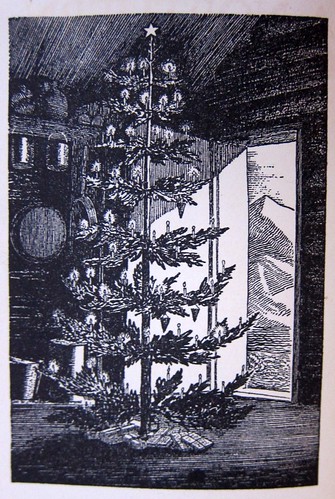
Let it snow or rain and grow dark at midday! The better shall be our good Christmas cheer within. This is the true Christmas land. The day should be dark, the house further overshadowed by the woods, tall and black. And there in the midst of that somber, dreadful gloom the Christmas tree should blaze in glory unrivaled by moon or sun or star.
Rockwell Kent, A Northern Christmas
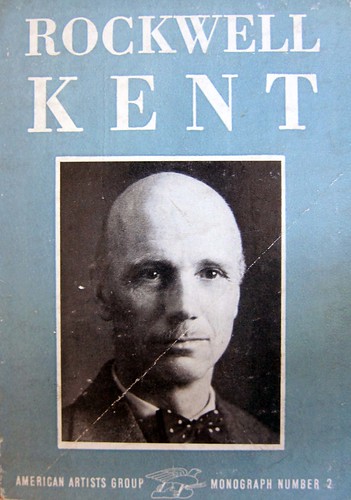
Rockwell Kent (1882-1971) was born and educated in New York. His first art teacher was William Merritt Chase; later he studied with Abbott Handerson Thayer, Robert Henri, and Kenneth Hayes Miller. Kent also trained as an architectural draftsman and was an accomplished carpenter. He worked in a variety of artistic media, but he is best known for his prints and for his many illustrations for classic literary works like Candide, Leaves of Grass, The Canterbury Tales, and, perhaps most famously, Moby Dick.
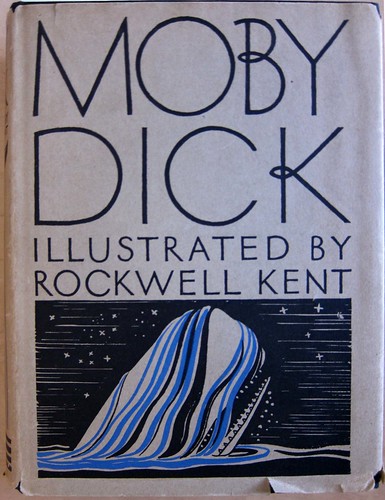
Kent also wrote and illustrated several of his own books, many of them memoirs of his extensive travels. He often sought out remote areas of untouched wilderness for artistic inspiration. In 1918-19 he spent several months in Alaska with his young son (also named Rockwell). The resulting book, called Wilderness, was published by G. P. Putnam in 1920.
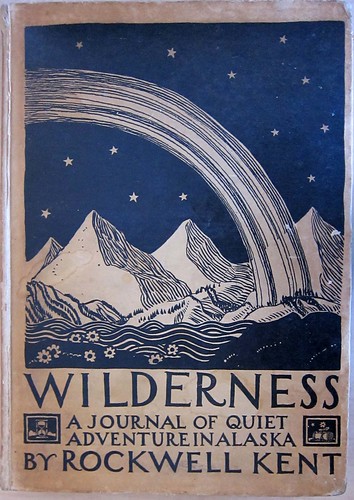
The south coast of the mainland of Alaska is a wilderness of spruce-clad mountains whose outlying, isolated peaks are islands. On one of these we lived, a father and his eight-year-old son. . . . the man in pursuit of his profession, the boy in pursuit of what of education lay in doing things, and both in that pursuit of happiness which, with whatever right, is still what every living creature wants. . . .
Of the fullness of the days–fullness of work and thought, of play, of little happenings, of uneventful peace–we kept record. That record is a book: its name is WILDERNESS. From WILDERNESS these notes about a happy Christmas in the north are drawn.
A Northern Christmas
The Rockwell Kent Papers in the Archives of American Art include extensive correspondence between Kent and Samuel Golden of the American Artists Group. In the 1941 correspondence they discuss all aspects of the production of A Northern Christmas, beginning with the necessity of getting permission from G. P. Putnam for the use of excerpts and illustrations from Wilderness. The publisher at first demanded a rather steep fee but became more reasonable after a “sharply worded letter” from Kent. In the end, Kent insisted that Putnam’s cooperation should be acknowledged in the colophon of A Northern Christmas.
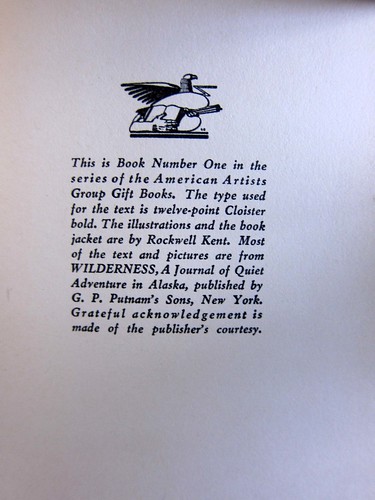
A Northern Christmas consisted mostly of excerpts from Wilderness, along with an introduction and a few new illustrations.
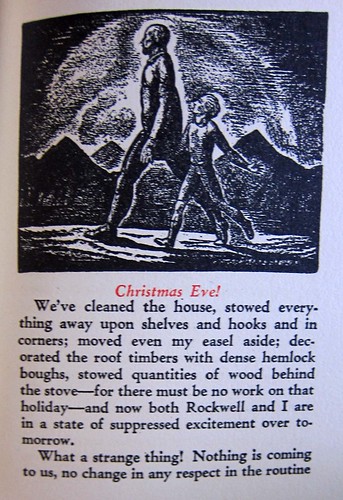
For Rockwell Kent, the wilderness idyll was a welcome respite from the materialism of the modern world. In the excerpts chosen for A Northern Christmas, Kent describes, in words and pictures, the spare and simple Christmas that he and his son celebrated with their landlord, an old Swedish homesteader named Olson. The presents are few– young Rockwell receives a pocket knife, some old National Geographic magazines, and a broken fountain pen, but he “sits on the bed looking at the things as if they were the most wonderful gifts.” The holiday proves all the more memorable for its minimalism.
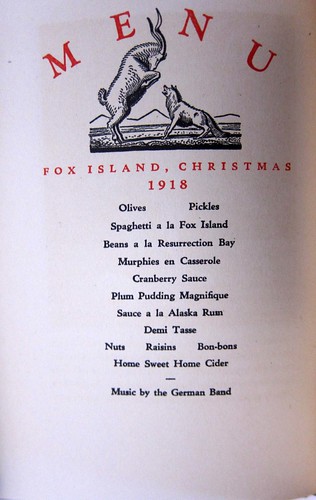
The food is good and plentiful, the night is long, only the Christmas candles are short-lived and we extinguish them to save them for another time. Finally, as the night deepens, Olson leaves us amid mutual expressions of delight in one another’s friendship, and Rockwell and I tumble into bed.
A Northern Christmas
Rockwell Kent wrote and illustrated a very different gift book for the American Artists Group the next year. The 1942 book, called On Earth Peace, is a rather bleak wartime fable about a Jazz Age princess humbled by loss and privation.
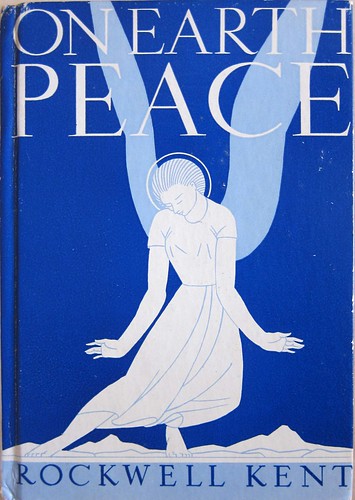
Kent’s popularity as an artist waned somewhat after the war. His style fell out of fashion in the age of abstract expressionism, and his ongoing involvement in socialist causes aroused suspicion in the Red-baiting 1950s. At one point Kent’s passport was revoked, and he sued to have it reinstated. The U.S. Supreme Court eventually ruled in his favor, a landmark decision that made it more difficult for the government to curtail a citizen’s right to travel. Kent continued to work for progressive causes and tried to promote improved relations between the U.S. and the Soviet Union.
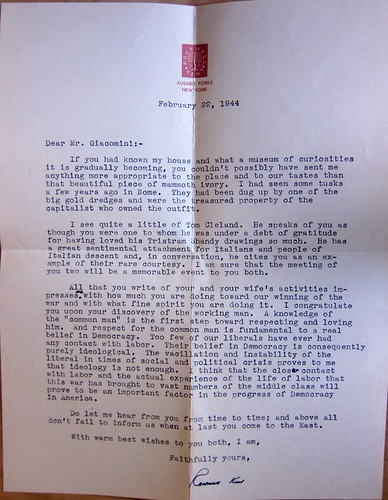
The items pictured here are all held by ZSR Library’s Special Collections. The library has a sizeable collection of Rockwell Kent books, most of them previously owned by publisher Lynwood Giacomini, whose collection of American literature was purchased by the library in 1976. Giacomini kept up a friendly correspondence with many authors, and his collection includes a few typed letters from Rockwell Kent.

6 Comments on ‘A Northern Christmas, by Rockwell Kent (1941)’
Lovely illustrations, and I enjoyed seeing the menu from A Northern Christmas…
How cool, I continue to be delighted by the wonderful ZSR Special Collections!
Great post. I love the illustrations.
I love everything about Kent’s work-especially his graphic style. The cover of Moby Dick is incredible. Thanks for this timely edition of RBOM. This leaves me wondering: what are Murphies?
Craig– murphies are, I believe, a type of potato.
This is really a beautiful addition to the Rare Book of the Month. Thanks for giving us such detail about a time so different from our own. It leaves me nostalgic for a simpler time.